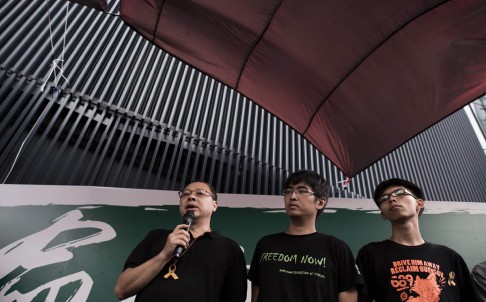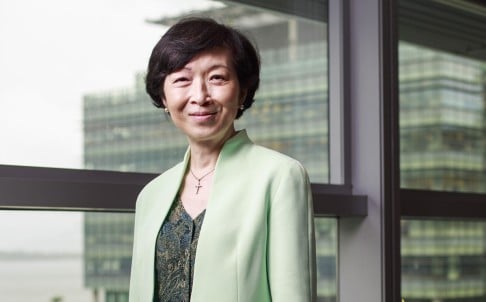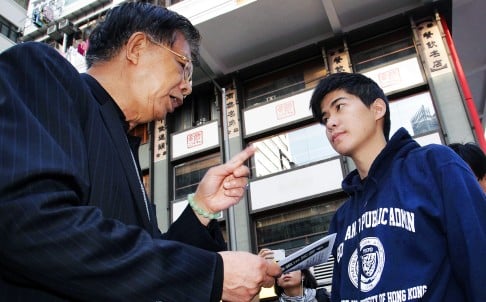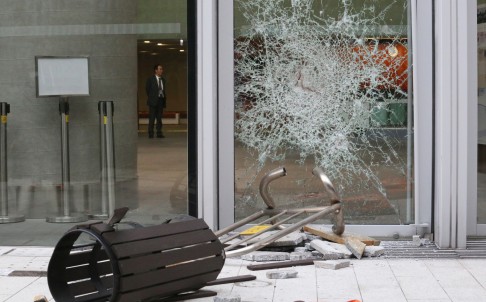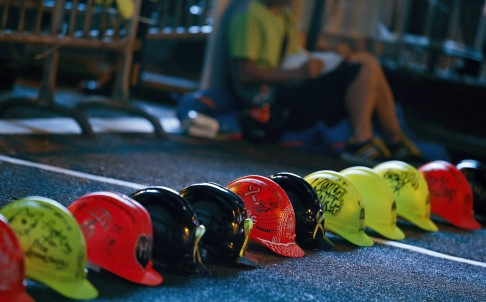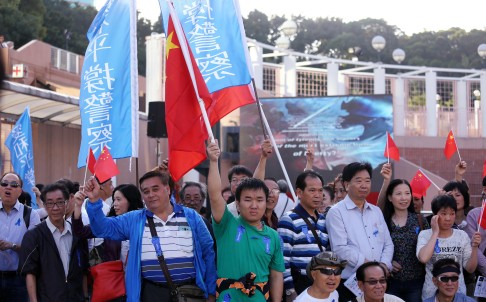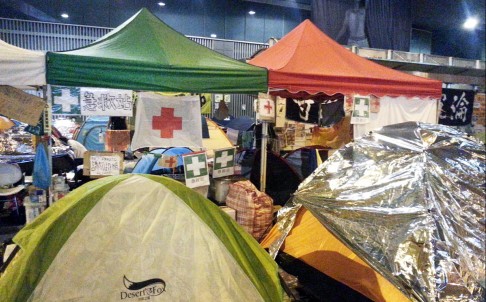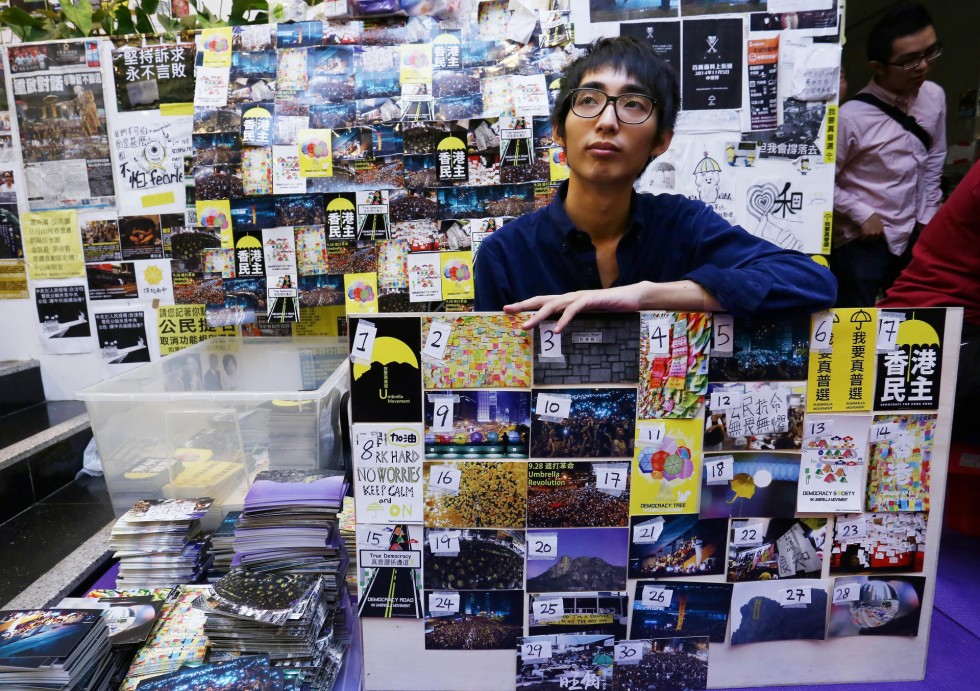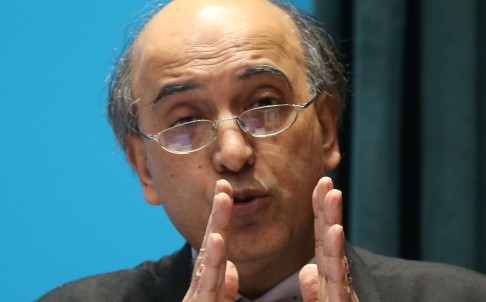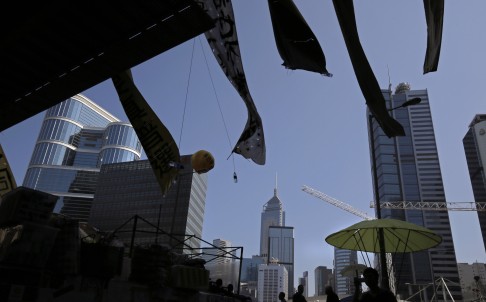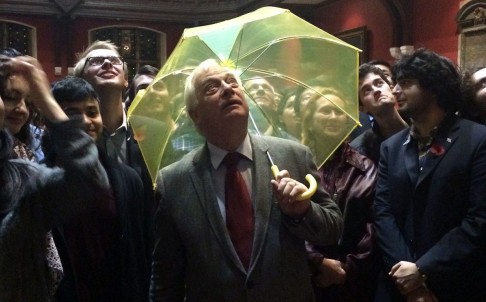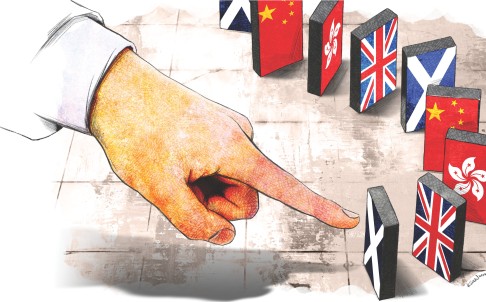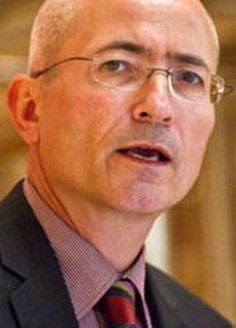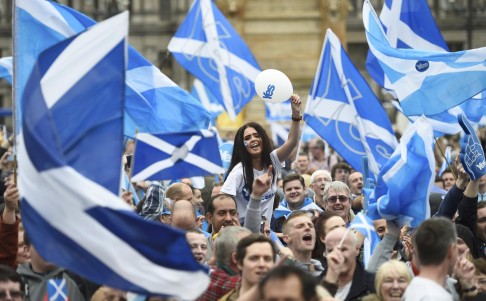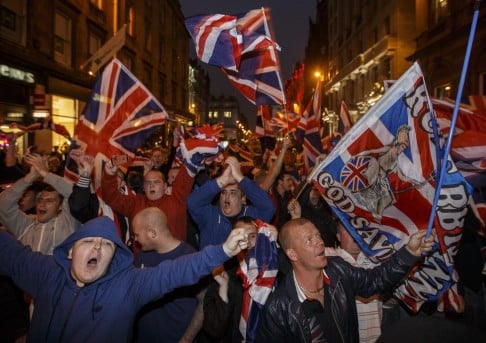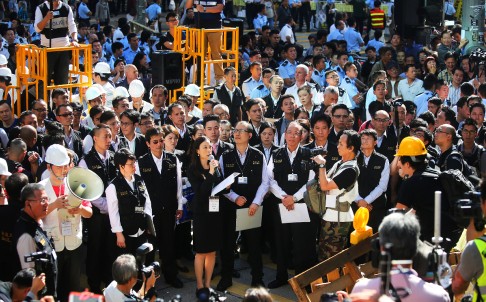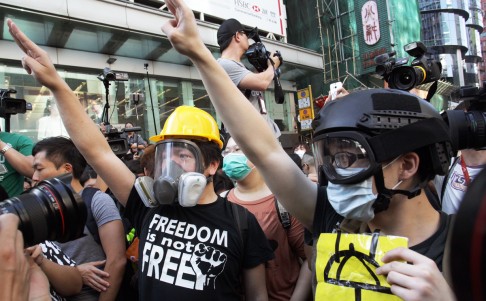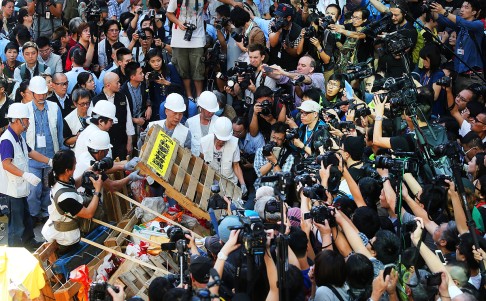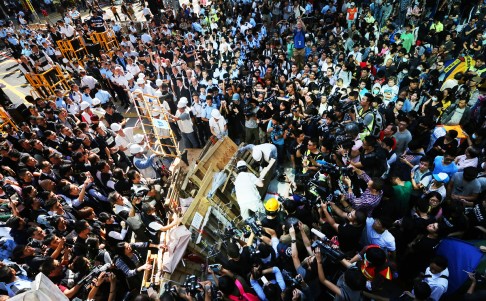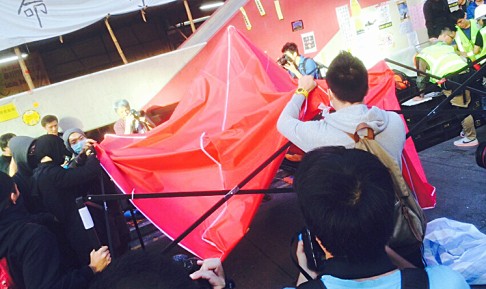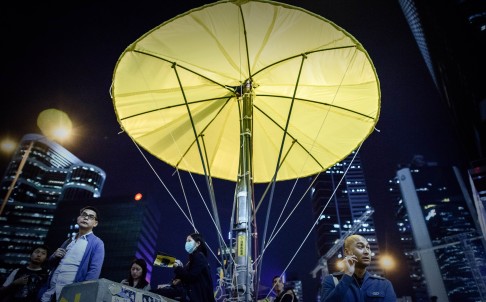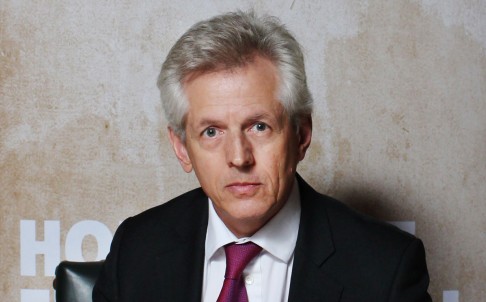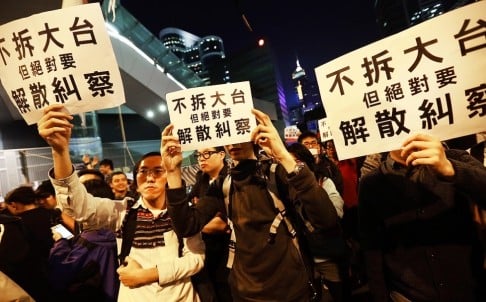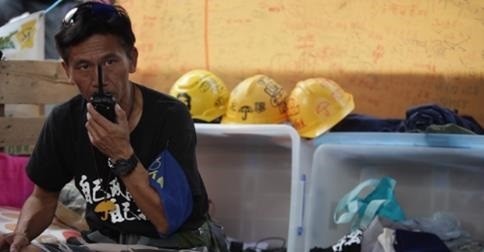Re: HK Protest Leaders High! Demands Talks With 11 Jinping In Peking!
How Hong Kong can best counter pernicious external influences
Regina Ip says that, to fight harmful external ideas, the best option for the government is to resell the benefits of the Basic Law and 'one country, two systems' to the people
PUBLISHED : Sunday, 23 November, 2014, 6:03am
UPDATED : Sunday, 23 November, 2014, 6:03am
Regina Ip

There is strong evidence that Hong Kong's "umbrella movement" owes much to Taiwan's student-led "sunflower" movement. Photo: Reuters
Ever since Occupy Central erupted, a familiar refrain in media reports on the mainland has been the involvement of "external forces". During the recent Apec leaders' meeting in Beijing, US President Barack Obama denied any US involvement in fostering the protest. Yet Hong Kong Chief Executive Leung Chun-ying has said he would produce evidence of external involvement at an appropriate time.
Who's telling the truth? Both were probably telling the truth as they knew it. Yet, whatever the facts at their fingertips, it would be hard to pin down "external involvement" in Hong Kong's Occupy protest as criminal activities that could be proscribed under existing Hong Kong laws.
When mainland media, and occasionally mainland officials, talked about "external forces", the words they used - waibu shili - should more accurately be translated as "external influence". If "external influence" is identified as the chief driving force behind the protest, there is more than a germ of truth in that. The idea of "civil disobedience" - the subject of an essay by Henry Thoreau in the mid-19th century - came from the West. The idea of Occupy came from the US - it started with the Occupy Wall Street protest of 2011. The idea of civic nomination also came from the US. Taiwan's electoral system, much admired by local, pro-democracy academics as more democratic than that of Hong Kong, permits "public" nomination of a presidential candidate. The provenance of the "public nomination" system in Taiwan is probably the US, given the pervasive US influence on the island.
There is strong evidence that Hong Kong's "umbrella movement" - the colour symbolism, the wording of the slogans and the mode of mobilisation - owes much to Taiwan's student-led "sunflower" movement. The repeated attempts by students and rioters to occupy government headquarters and more recently the Legislative Council may well have been inspired by the "sunflower" movement's occupation of the Legislative Yuan earlier this year. At least one pro-Taiwan independence scholar has turned up at Hong Kong's occupied areas to speak to protesters. In the past year, Hong Kong academics and legislators heavily involved in the Occupy protest have travelled to Taiwan to learn from the "sunflower" movement. Several leaders of Taiwan's movement are also known to have visited Hong Kong soon after Occupy broke out.
So the word waibu, meaning external, but not waiguo, meaning foreign, was carefully chosen. But even if American ideas and Taiwan's "sunflower" movement did exert considerable influence on Hong Kong's Occupy protest, there are few, if any, provisions in our laws which would permit the authorities to clamp down on outside factors. The only legal provisions which deal with a connection with "foreign political bodies" and "political organisations of Taiwan" are those in the Societies Ordinance, under which terms like "connection", "foreign political body" and "political organisation of Taiwan" are so tightly defined that they cannot possibly be used to proscribe the sort of inspirational relationship which is likely to have existed between Taiwan's "sunflower" student moment and our Occupy protest.
It would be a totally different proposition if a foreign government is found to have funded undercover programmes, under the guise of public health or civic education programmes, to encourage regime change. The US State Department recently admitted to reviewing a secretive "democracy-promotion" programme in Cuba after investigations revealed that the US Agency for International Development had been involved in setting up Zun Zuneo, a Twitter-like service designed to recruit dissidents and foment "positive change", via a front company established and funded by USAid. If such activities are undertaken in Hong Kong, sophisticated legislation would be needed to outlaw activities which are not necessarily violent but calculated to instil instability by fomenting protests and calling for the head of government to step down.
The challenge goes beyond drafting laws to proscribe subversive actions. While clever legislation could always be devised to counter such action, it would be much harder to eradicate and counter ideas which have taken hold of people's hearts and minds. Hong Kong being what it is - an extremely open, international city which has always been receptive to and shaped by many ideas of the West - it would be extremely difficult to shut out some external ideas and influences deemed threatening while retaining others which have served the city well. For many Occupy supporters, democracy and freedom are two sides of the same coin It is only recently, when people discovered the "true democracy" narrative is false, or pushed so far that it has undermined the rule of law, that support for Occupy has started to recede.
To counter pernicious external influences, the government needs more than new, clever legislation, It needs a core, rational philosophy capable of countering international causes which have become, in the eyes of some, a just cause above the law. It needs a new narrative which makes "one country, two systems" and the achievement of the Basic Law once again appealing to Hong Kong people.
Regina Ip Lau Suk-yee is a legislator and chair of the New People's Party
How Hong Kong can best counter pernicious external influences
Regina Ip says that, to fight harmful external ideas, the best option for the government is to resell the benefits of the Basic Law and 'one country, two systems' to the people
PUBLISHED : Sunday, 23 November, 2014, 6:03am
UPDATED : Sunday, 23 November, 2014, 6:03am
Regina Ip

There is strong evidence that Hong Kong's "umbrella movement" owes much to Taiwan's student-led "sunflower" movement. Photo: Reuters
Ever since Occupy Central erupted, a familiar refrain in media reports on the mainland has been the involvement of "external forces". During the recent Apec leaders' meeting in Beijing, US President Barack Obama denied any US involvement in fostering the protest. Yet Hong Kong Chief Executive Leung Chun-ying has said he would produce evidence of external involvement at an appropriate time.
Who's telling the truth? Both were probably telling the truth as they knew it. Yet, whatever the facts at their fingertips, it would be hard to pin down "external involvement" in Hong Kong's Occupy protest as criminal activities that could be proscribed under existing Hong Kong laws.
When mainland media, and occasionally mainland officials, talked about "external forces", the words they used - waibu shili - should more accurately be translated as "external influence". If "external influence" is identified as the chief driving force behind the protest, there is more than a germ of truth in that. The idea of "civil disobedience" - the subject of an essay by Henry Thoreau in the mid-19th century - came from the West. The idea of Occupy came from the US - it started with the Occupy Wall Street protest of 2011. The idea of civic nomination also came from the US. Taiwan's electoral system, much admired by local, pro-democracy academics as more democratic than that of Hong Kong, permits "public" nomination of a presidential candidate. The provenance of the "public nomination" system in Taiwan is probably the US, given the pervasive US influence on the island.
There is strong evidence that Hong Kong's "umbrella movement" - the colour symbolism, the wording of the slogans and the mode of mobilisation - owes much to Taiwan's student-led "sunflower" movement. The repeated attempts by students and rioters to occupy government headquarters and more recently the Legislative Council may well have been inspired by the "sunflower" movement's occupation of the Legislative Yuan earlier this year. At least one pro-Taiwan independence scholar has turned up at Hong Kong's occupied areas to speak to protesters. In the past year, Hong Kong academics and legislators heavily involved in the Occupy protest have travelled to Taiwan to learn from the "sunflower" movement. Several leaders of Taiwan's movement are also known to have visited Hong Kong soon after Occupy broke out.
So the word waibu, meaning external, but not waiguo, meaning foreign, was carefully chosen. But even if American ideas and Taiwan's "sunflower" movement did exert considerable influence on Hong Kong's Occupy protest, there are few, if any, provisions in our laws which would permit the authorities to clamp down on outside factors. The only legal provisions which deal with a connection with "foreign political bodies" and "political organisations of Taiwan" are those in the Societies Ordinance, under which terms like "connection", "foreign political body" and "political organisation of Taiwan" are so tightly defined that they cannot possibly be used to proscribe the sort of inspirational relationship which is likely to have existed between Taiwan's "sunflower" student moment and our Occupy protest.
It would be a totally different proposition if a foreign government is found to have funded undercover programmes, under the guise of public health or civic education programmes, to encourage regime change. The US State Department recently admitted to reviewing a secretive "democracy-promotion" programme in Cuba after investigations revealed that the US Agency for International Development had been involved in setting up Zun Zuneo, a Twitter-like service designed to recruit dissidents and foment "positive change", via a front company established and funded by USAid. If such activities are undertaken in Hong Kong, sophisticated legislation would be needed to outlaw activities which are not necessarily violent but calculated to instil instability by fomenting protests and calling for the head of government to step down.
The challenge goes beyond drafting laws to proscribe subversive actions. While clever legislation could always be devised to counter such action, it would be much harder to eradicate and counter ideas which have taken hold of people's hearts and minds. Hong Kong being what it is - an extremely open, international city which has always been receptive to and shaped by many ideas of the West - it would be extremely difficult to shut out some external ideas and influences deemed threatening while retaining others which have served the city well. For many Occupy supporters, democracy and freedom are two sides of the same coin It is only recently, when people discovered the "true democracy" narrative is false, or pushed so far that it has undermined the rule of law, that support for Occupy has started to recede.
To counter pernicious external influences, the government needs more than new, clever legislation, It needs a core, rational philosophy capable of countering international causes which have become, in the eyes of some, a just cause above the law. It needs a new narrative which makes "one country, two systems" and the achievement of the Basic Law once again appealing to Hong Kong people.
Regina Ip Lau Suk-yee is a legislator and chair of the New People's Party

